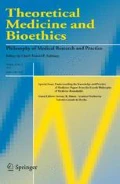Abstract
When children are too young to make their ownautonomous decisions, decisions have to be madefor them. In certain contexts we allow parentsand others to make these decisions, and do notinterfere unless the decision clearly violatesthe best interest of the child. In othercontexts we put a priori limits on whatkind of decisions parents can make, and/or whatkinds of considerations they have to take intoaccount. Consent to medical research currentlyfalls into the second group mentioned here. Wewant to consider and ultimately reject one ofthe arguments put forward for putting medicalresearch into the second category. We willargue that some objections to children'sparticipation in research are either based onan implausibly restrictive conception of whatis in fact in the child's best interests orthat there is an implicit and false premisehidden in this argument; i.e., the premise thatour children have so deeply fallen into moralturpitude that we must assume that they wouldnot want to fulfill their moral obligations,or, that they will grow up to be morallydeficient and will then wish not to have actedwell while a child.
Similar content being viewed by others
REFERENCES
Buchanan, A.E., Brock, D.W. Deciding for Others: The Ethics of Surrogate Decision Making. Cambridge: Cambridge University Press, 1989.
Harris, J. “Consent and End of Life Decisions.” The Journal of Medical Ethics 2003, in press.
Harris, J. “Ethical Genetic Research.” Jurimetrics: The Journal of Law, Science, and Policy 40 (1999): 77–93.
Harris, J. “Research on Human Subjects, Exploitation and Global Principles of Ethics.” In: Lewis, A.D.E., Freeman, M., eds. Law and Medicine: Current Legal Issues. Oxford University Press, 2000, pp. 379–399.
Hart, H.L.A. “Are There any Natural Rights?” The Philosophical Review 64 (1955): 175–191.
Holm, S. “Autonomy, Authenticity, or Best Interest: Everyday Decision-making and Persons with Dementia.” Medicine Health Care and Philosophy 4 (2001): 153–159.
Holm, S. “Conducting Research in the Alzheimer Population: Balancing Individual, Group, Family and Societal Interests.” In: Purtillo, R., ten Have H., eds. Ethical Foundations for Palliative Care Approaches in Alzheimer's Disease. Baltimore MD: Johns Hopkins University Press, 2003, in press.
Jonas, H. “Philosophical Reflections on Experimenting with Human Subjects.” In: Freund, P. A., ed. Experimentation with Human Subjects. London: Allen and Unwin, 1972, pp. 1–31.
Kurtines, W.M., Gewirtz, J.L. Handbook of Moral Behavior and Development, 3 vols. Hillsdale, NJ: Lawrence Erlbaum, 1991.
Nozick, R. Anarchy, State and Utopia. Oxford: Blackwell, 1974.
Ramsey, P. “Children as Research Subjects: A Reply.” Hastings Center Report 7 (1977): 40–41.
Ramsey, P. “The Enforcement of Morals: Non-therapeutic Research on Children.” Hastings Center Report 6 (1976): 21–30.
Ramsey, P. The Patient as Person. New Haven, CT: Yale University Press, 1970.
Rawls, J. A Theory of Justice. Cambridge, MA: Harvard University Press, 1972.
Ross, L.F. Children, Families and Health Care Decision Making. Oxford: Clarendon Press, 1998.
World Medical Association (W.M.A.). Declaration of Helsinki: Ethical principles for medical research involving human subjects. As adopted by the 18th W.M.A., Helsinki, Finland, 1964. The declaration has been amended multiple times: by the 29th W.M.A., Tokyo, Japan, 1975, the 35th W.M.A., Venice, Italy, 1983, the 41st W.M.A., Hong Kong, China, 1989, the 48th W.M.A. Somerset West, Republic of South Africa, 1996, the 52nd W.M.A., Edinburgh, Scotland, 2000. Note of Clarification on Paragraph 29 added by the WMA General Assembly, Washington 2002. Can be found on the web at: <http://www.wma.net/e/policy/17cnote.pdf>.
Author information
Authors and Affiliations
Rights and permissions
About this article
Cite this article
Harris, J., Holm, S. Should we presume moral turpitude in our children? – Small children and consent to medical research. Theor Med Bioeth 24, 121–129 (2003). https://doi.org/10.1023/A:1024651013837
Issue Date:
DOI: https://doi.org/10.1023/A:1024651013837




